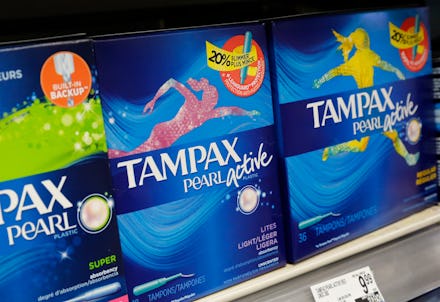Chicago Abolishes the Tampon Tax, Takes a Stand for All Who Menstruate

The bloody gift that is menstruation is enough of a hassle on its own, without the added burden of having to pay a tax for "non-necessary" items like tampons or pads. If you're tired of shelling out extra money each month for the "luxury" of not bleeding all over yourself, maybe consider going to Chicago. City officials there know what's up.
As part of a growing movement to end taxation on menstrual products, the Chicago City Council voted on Wednesday to remove the city's sales tax on tampons and sanitary napkins to "correct an unfairness to women," according to the Associated Press. The move will reclassify tampons and pads as medical necessities and cut the city's portion of sales tax on menstrual products, which are currently taxed at 10.25%. Overall, that will reduce the cost of tampons and the like by 1.25%.
That number might be small, but it's not insignificant. Chicago's move could especially benefit low-income menstruating population, which tends to be disproportionately burdened by the additional cost of menstrual products. Jennifer Weiss-Wolf, a feminist activist and vice president for development at the Brennan Center for Justice, explained the powerful message behind the Council's vote.
"Chicago's decision is more symbolic than it is actual cash-in-hand for people, but every penny counts," Weiss-Wolf told Mic. "This has been a question of equity, discrimination and fairness. That's why the tax issue is being raised: Those for whom it's most challenging to afford [menstrual products] ... shouldn't face challenges to attaining education or doing their jobs because they don't have access to tampons or pads."
Indeed, the Chicago vote could also have far-reaching implications for the rest of the country. Only five states have already eliminated sales tax on menstrual products, and others, like Utah, have actively decided to keep the so-called "tampon tax" in place.
However, several other states — including Illinois — are already considering legislation similar to Chicago's, and could be well on the way to exempting menstrual products as necessities this legislative session. On Tuesday, the New York State Assembly voted unanimously to rescind the state sales tax on tampons and pads, a measure the state Senate is expected to approve as well. (Additionally, New York City is taking the menstrual product equity revolution further, and will soon begin providing tampons and pads in some public schools.)
The push to end the tampon tax has increasingly become a nationwide movement, sending a message that many Americans, whether they menstruate or not, will no longer stand for dated, biased policies. Even President Barack Obama has come out against menstrual product taxation: In January, he told YouTube star Ingrid Nilsen he had "no idea why" states would make people who menstruate pay more for tampons, but surmised "it's because men were making the laws when those taxes were passed."
Other tampon tax opponents, like Weiss-Wolf, are inclined to agree. She told Mic the tax is "the central linchpin of so many issues of equity and equality in our society," and representative of gender inequality embedded in public policy. That's highlighted by the discrepancy between the items some states exempt from taxation: In California, which is currently considering ending its tampon tax, erectile dysfunction medication isn't taxed but menstrual products are. In Indiana, people can buy barbecued sunflower seeds tax-free, but not a box of Playtex.
In that sense, opposing the tampon tax isn't simply about making menstrual products more affordable for those across the country who need them, but about ending inequities in the law. It's about ensuring equal opportunity for everyone who menstruates.
"[The tax] is a great tool for raising awareness about what it means not to be able to afford tampons," Weiss-Wolf said. "It's a question of fairness and discrimination. I want to see it in every state."